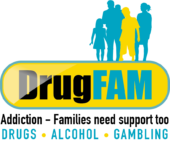Support for those affected by the gambling harms of others
Don't be on your own. Pick up the phone.
Supporting partners, family, friends, work colleagues and carers affected by a loved one's harmful gambling
A Gambling Disorder is a repeated pattern of gambling behaviour where someone: feels they have lost control, continues to gamble despite negative consequences and sees gambling as more important to them than any other interest or activity.
Research highlights that 2.7% of adults in the UK are problematic gamblers, with 7% of adults reporting that they are negatively affected by someone else’s gambling.
At DrugFAM we understand the difficulties of living with or caring for someone who has an addiction to gambling and how easily others can find themselves in a position of disempowerment and crisis. We also know how physically and emotionally exhausting this can be, especially when someone seems intent on self-destruction. DrugFAM believes that those affected need support in their own right, both to cope with impact of their loved one’s behaviour and with how best to help someone who has lost control of how they gamble.
Our aim is to help find ways of coping better with their situations, so they can start to regain control of their lives and look after their own well-being. This is achieved through focusing on the changes which can be made to help improve the situation with the person who gambles and most importantly for the well-being of those affected.
Five signs to look out for if you’re concerned about someone else’s gambling:
Preoccupation –The gambler may be preoccupied with their phone or, if they gamble in a land based venue, may make excuses to leave the house regularly. They may make excuses to avoid spending time with family and friends or neglect activities they used to enjoy so that they can have more time to gamble.
Dishonesty – Lying can become habitual for gamblers. They may lie about why they are spending so much time on their phones, where they are going or hide letters they receive in the post.
Money concerns – You may have noticed that your loved one never has money, even on payday, and may ask to borrow money regularly. You may also notice irregularities in your bank account such as regular, large withdrawals.
Changes in mood – Gamblers can become easily irritated. They may feel a lot of guilt and shame about their addiction but as they can’t express this, this may manifest as anger or frustration with loved ones.
Poor sleep – Gamblers may have issues sleeping as a result of the worry and stress they are experiencing. Many people who gamble online describe staying up late at night to gamble while their family members are asleep.
You can access support in a number of ways:
Call our helpline – 0300 888 3853
The helpline is available between 9am and 9pm seven days a week. Our clients feel a huge sense of relief at being able to talk to our trained support team and realise that they no longer have to cope on their own.
Sometimes picking up the phone can feel too difficult so sending an email can be an alternative way of getting in touch with us. Some clients prefer communicating via email as it gives them a structured way of organising their thoughts and processing their feelings. Please click here to send us a message.
Receive 1 to 1 support
In early 2022 we recruited two new Family Support Workers with significant experience of supporting people affected by a loved one’s harmful gambling to help us ensure we are providing the best support we can. We will soon be in a position to provide free 1 to 1 support to those affected
Attend one of our support groups
We are currently in the processing of establishing new weekly support group meetings for people affected by a loved one’s harmful gambling.
